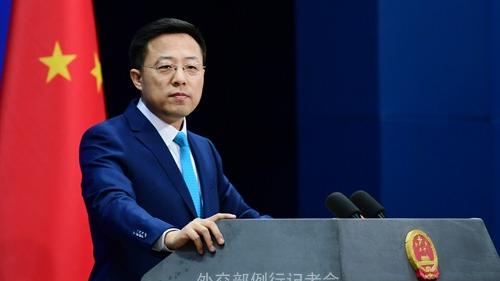 This file photo shows Foreign Ministry Spokesperson Zhao Lijian at a regular press conference on March 5, 2020, in Beijing, China. (PHOTO/FOREIGN MINISTRY OF THE PRC)
This file photo shows Foreign Ministry Spokesperson Zhao Lijian at a regular press conference on March 5, 2020, in Beijing, China. (PHOTO/FOREIGN MINISTRY OF THE PRC)
BEIJING - China strongly urges Japan to reconsider its decision on the disposal of nuclear waste, a Foreign Ministry spokesperson said Wednesday.
Spokesperson Zhao Lijian made the remarks at a daily news briefing when asked to comment on the international response to Japan's decision to dispose of Fukushima's radioactive water by releasing it into the sea. The international community including the Republic of Korea (ROK), Russia and the European Commission expressed deep concern over the issue.
Zhao said China strongly urges the Japanese side to face up to its responsibility, follow the science, fulfill its international obligations and duly respond to the serious concerns of the international community, neighboring countries and its own people
Zhao said China strongly urges the Japanese side to face up to its responsibility, follow the science, fulfill its international obligations and duly respond to the serious concerns of the international community, neighboring countries and its own people.
Citing Japanese media report that the work of releasing nuclear waste into the sea will start in two years and last for 30 years and that the total amount of nuclear waste will exceed 1 million tonnes, Zhao said that the amount, duration, scope of affected areas and the risk level is unprecedented.
He then raised three questions to the Japanese side.
READ MORE: Fukushima: Seoul aims to fight Japan's decision at world court
First, has the Japanese side really heard the doubts and concerns at home and abroad?
Zhao pointed out that there were protest marches in many places in Japan including Tokyo and Fukushima. Besides China, ROK, Russia and the EU, 311 environmental groups expressed firm opposition to the Japanese decision. The Climate and Energy Campaigner at Greenpeace Japan said that the Japanese government turned its back on the clear evidence that the technology and conditions for greater storage capacity is available, they have opted for dumping the water into the Pacific Ocean.
"The Japanese government has taken the wholly unjust decision in total disregard of the environment," he said.
ALSO READ: Study: Contaminants in Fukushima water to cross Pacific Ocean
Second, does Japan's decision really comply with international law?
Zhao said Japan's decision will set a precedent for discharging treated wastewater into the ocean after a serious nuclear accident. Japan, as a signatory to the United Nations Convention on the Law of the Sea (UNCLOS), should be aware of the relevant provisions of the Convention. States shall take all measures necessary to ensure that pollution arising from incidents or activities under their jurisdiction or control does not spread beyond the areas where they exercise sovereign rights in accordance with the Convention.
Besides China, ROK, Russia and the EU, 311 environmental groups expressed firm opposition to the Japanese decision
"Japan is also obliged to undertake such international obligations as notification and full consultation, environmental assessment and monitoring, preventive measures to minimize risks, and information transparency," Zhao said. "Has Japan fulfilled all these obligations?"
He further noted that the endorsement of the Japanese decision by the United States does not mean endorsement by the international community, and the United States should shoulder its responsibility and urge Japan to prudently handle the disposal issue in an honest, scientific and responsible manner for the sake of marine environment and mankind's health rather than confusing right with wrong, foregoing principles and adopting double standard.
Third, does the nuclear wastewater that Japan plans to release into the sea really meet international standards?
Zhao said that the assessment report of the International Atomic Energy Agency (IAEA) expert group clearly pointed out that the treated water still contains other radionuclides apart from tritium. According to statistics by Tokyo Electric Power Company Holdings Inc., there are 62 kinds of radionuclides in the water.
"The oceans are not Japan's trash can, and the Pacific Ocean is not Japan's sewer," said the spokesperson, adding that the price of Japan's disposal of nuclear waste should not be borne by the entire world.
Zhao said the Japanese side should reevaluate the issue and refrain from wantonly discharging the wastewater before reaching consensus with all stakeholders and the IAEA through full consultations.
"China reserves the right to make further reactions," Zhao added.


